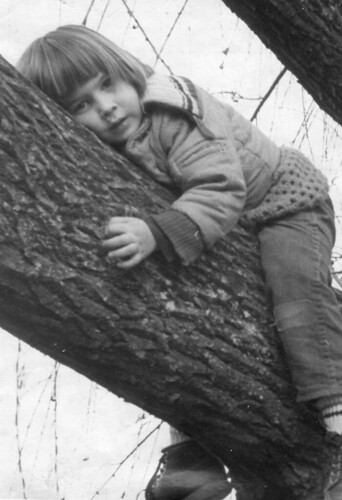Jan 27 2023
Yoka Genkaku – Just take hold of the source (from The Shodoka)
Just take hold of the source (from The Shodoka)
by Hsuan Chueh of Yung Chia / Yoka Genkaku
English version by Robert Aitken
Just take hold of the source
And never mind the branches.
It is like a treasure-moon
Enclosed in a beautiful emerald.
Now I understand this Mani-jewel
And my gain is the gain of everyone endlessly.

/ Image by Unknown. Child: Ivan_M_Granger /
Just take hold of the source
And never mind the branches.
These lines express the essentialism of Zen so well. We are reminded not to dally about with the endless manifestations of the mind and its experiences — even ‘spiritual’ experiences.
Picture a tree for a moment, an ancient tree with a strong trunk. This is the tree of pure awareness. The trunk is the central structure, the source, the foundation of reality, while the branches are the many phenomena that emerge. Each branch is the perception of an experience, an object, a sensation, an encounter, an event. Most people hover at the outer reaches of the tree, and they only ever know the touch of its branches. It is easy to spend an entire lifetime there fascinated by the play of light upon the leaves, endlessly seeking the sweet fruits that grow there, imagining each branch to be its own separate, unrelated experience. And there is always one more branch to explore. There is always one more experience to be had.
But if we really want to know the nature of this tree that is everything to us, then we must find a sturdy branch and trace its route in to the central trunk. We follow the pathways of the mind to the core of still awareness from which mind emerges. Only then do we see what it is that the branches express. Only then do we understand the nature of experience, mind, and awareness. Only then do we know ourselves and our true relationship to the world we experience.
When Hsuan Chueh proclaims that “my gain is the gain of everyone endlessly,” he is reaffirming what mystics have always asserted, that, in that moment of pure awareness, all conflicts, opposites, disharmonies, even past and future, are resolved within the individual. For those who, through compassion, wish to bring healing to the world, the way to do this is to first bring the world to resolution within oneself, and then all actions naturally lead toward establishing that balance externally. Or perhaps we should say all of the world is found to be within oneself. When the world is resolved within, the mind ceases to project false images externally. Resolving the world within, brings “gain” to oneself and automatically brings “gain” to everyone else since everything emanates from that single point of resolution and there is nothing truly external.
And my gain is the gain of everyone endlessly.
(PS- That photo of the boy in the tree… that’s me in the early 1970s.)
Recommended Books: Hsuan Chueh of Yung Chia / Yoka Genkaku
| This Dance of Bliss: Ecstatic Poetry from Around the World | Buddhism and Zen | |||
|
Hsuan Chueh of Yung Chia / Yoka Genkaku
China (665 – 713) Timeline |





